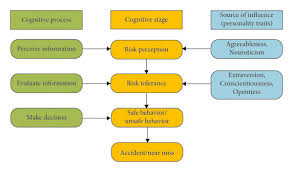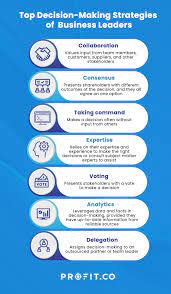Decision Making in Business
Decision making is a crucial aspect of running a successful business. Every day, business leaders and managers are faced with a myriad of choices that can impact the future of their company. Effective decision making is essential for achieving business goals and maintaining competitiveness in today’s fast-paced market.
There are several key factors to consider when making decisions in business:
- Data Analysis: Utilizing data and analytics to inform decision making can lead to more informed and strategic choices.
- Risk Assessment: Evaluating the potential risks and rewards of a decision is vital for minimizing negative outcomes.
- Stakeholder Involvement: Involving key stakeholders in the decision-making process can lead to greater buy-in and support for decisions.
- Long-Term Impact: Considering the long-term effects of a decision is crucial for ensuring sustainable growth and success.
Additionally, it’s important for businesses to have a structured decision-making process in place. This may involve gathering relevant information, analyzing alternatives, weighing pros and cons, and ultimately selecting the best course of action.
In today’s rapidly changing business landscape, adaptability and agility are also key components of effective decision making. Businesses must be able to pivot quickly in response to market shifts, technological advancements, and other external factors that can impact their operations.
Ultimately, successful businesses are those that prioritize effective decision making as a core part of their organizational strategy. By employing sound judgment, leveraging data-driven insights, and involving stakeholders in the process, businesses can make informed decisions that drive growth and innovation.
8 Essential Tips for Effective Decision Making in Business
- Define the decision that needs to be made clearly.
- Gather all relevant information and data before making a decision.
- Consider both short-term and long-term implications of the decision.
- Involve key stakeholders in the decision-making process.
- Evaluate potential risks and benefits associated with each option.
- Use critical thinking and analytical skills to assess different alternatives.
- Make decisions based on facts and analysis rather than emotions or biases.
- Review and learn from past decisions to improve future decision-making.
Define the decision that needs to be made clearly.
In the realm of business decision making, it is essential to start by clearly defining the decision that needs to be made. This initial step sets the foundation for a successful decision-making process by providing clarity and focus on the specific issue at hand. By clearly outlining the decision that needs to be addressed, businesses can effectively identify the key factors, gather relevant information, and evaluate potential alternatives in a structured manner. This approach not only streamlines the decision-making process but also enhances the likelihood of reaching a well-informed and strategic conclusion that aligns with organizational goals.
Gather all relevant information and data before making a decision.
In the realm of business decision making, a crucial tip to adhere to is the necessity of gathering all relevant information and data before reaching a conclusion. By ensuring that all pertinent facts and figures are at your disposal, you can make well-informed decisions that are grounded in a solid understanding of the situation at hand. This practice not only minimizes the risk of making hasty or uninformed choices but also sets the foundation for strategic and successful decision making processes in business operations.
Consider both short-term and long-term implications of the decision.
When making decisions in business, it is essential to consider both the short-term and long-term implications of the choice at hand. While short-term outcomes may provide immediate benefits or resolutions, it is equally important to evaluate how the decision will impact the organization in the long run. By taking into account both time frames, businesses can make more strategic decisions that align with their overall goals and vision for sustained success and growth.
Involve key stakeholders in the decision-making process.
In the realm of business decision making, involving key stakeholders in the decision-making process is a critical tip for ensuring success. By engaging relevant parties such as employees, customers, suppliers, and investors in the decision-making process, businesses can gain valuable insights, perspectives, and support that can lead to more well-rounded and effective decisions. Stakeholder involvement fosters transparency, collaboration, and a sense of ownership among those impacted by the decisions, ultimately enhancing the likelihood of successful implementation and outcomes.
Evaluate potential risks and benefits associated with each option.
When making decisions in business, it is crucial to evaluate the potential risks and benefits associated with each option. By carefully assessing the risks involved and weighing them against the potential benefits, business leaders can make more informed and strategic choices. This process allows for a thorough understanding of the potential outcomes of each decision, enabling businesses to mitigate risks and capitalize on opportunities effectively.
Use critical thinking and analytical skills to assess different alternatives.
In the realm of business decision making, employing critical thinking and analytical skills to assess various alternatives is paramount. By carefully evaluating different options through a critical lens, businesses can gain deeper insights into potential outcomes, risks, and opportunities. This approach allows decision makers to make well-informed choices that align with their strategic goals and objectives, ultimately leading to more effective and successful business decisions.
Make decisions based on facts and analysis rather than emotions or biases.
When it comes to decision making in business, it is crucial to prioritize facts and analysis over emotions or biases. Making decisions based on concrete data and thorough analysis can lead to more informed and rational choices that are likely to yield positive outcomes for the business. By setting aside personal emotions and biases, business leaders can ensure that their decisions are grounded in objective information, ultimately enhancing the strategic direction and overall success of the organization.
Review and learn from past decisions to improve future decision-making.
Reviewing and learning from past decisions is a crucial tip for improving future decision-making in business. By analyzing the outcomes of previous choices, businesses can identify what worked well and what didn’t, enabling them to make more informed decisions moving forward. This process of reflection and evaluation helps organizations refine their decision-making processes, learn from mistakes, and capitalize on successes to drive continuous improvement and achieve greater success in the future.




